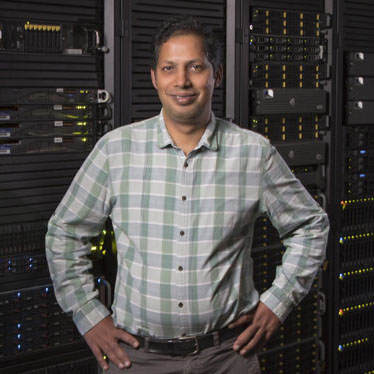The Algorithms & Randomness Center (ARC) is known as Georgia Tech’s “think tank” for the theory of computing and optimization. ARC is an interdisciplinary center at the intersection of engineering, math, and computer science. Mohit Singh, H. Milton Stewart Early Career Professor and associate professor in the H. Milton StewartSchool of Industrial and Systems Engineering (ISyE), is ARC’s new director.
“ARC brings faculty together around common problems within the three fields,” Singh explained. “The aim of the center is to utilize ISyE’s strength in optimization and probability, graph theory from mathematics,and algorithms from computer science. ARC is a forum for faculty knowledge, where those of us working on similar problems can collaborate and act as a force multiplier.”
Optimization has classically branched into two distinct subfields of continuous and discrete optimization progressing on close but distinct directions. Recent exciting developments have found interesting bridges between the two fields, and ARC-associated faculty have led many of these developments. Such bridges are finding applications in sampling algorithms, approximation algorithms, and classical problems such as maximum flow in networks or discrepancy problems in discrete mathematics. ARC-associated faculty are also focusing on optimization problems in machine learning that involve fairness.
“What is fairness?” asks Singh. “That’s actually a major research question, and the definition of fairness is based on the different contexts in which it is studied.” Fairness in classical opti-mization problems has been studied for decades, while more recently academicians have been examining statistical notions of fairness.
For example, a data set might consist of thousands of images of both men and women, with these images represented as vectors in huge dimensions. In order to process this data more quickly, it can be reduced to much smaller dimensions, which lends itself to some loss of data. The loss is comparatively small, and on average a typical image is still well preserved, but Singh’s students found that most of the images experiencing loss are images of women.
“I don’t care about average loss, such as how much of my image is retained from large dimensions to small dimensions,” said Singh. “But ideally I want the loss to be about equal between images of men and women. So what are the new algorithms that will accomplish this?”
Singh has been working on algorithmic problems since he was a Ph.D. student in the Algorithms, Combinatorics, and Optimization (ACO) program at Carnegie Mellon University’s Tepper School of Business. (In fact, Carnegie Mellon and Georgia Tech are the only two schools to offer an interdisciplinary ACO graduate degree.) His role as ARC’s director is a natural fit.
In this capacity, he helps bring in postdoctoral students who are helping drive the center’s cross-disciplinary research. Singh is planning to strengthen ARC’s close partnership with TRIAD (Transdisciplinary Research Institute for Advancing Data Science); the two centers have already jointly funded six to eight research proposals from young Ph.D. students. Singh is also planning continued collaborations with Georgia Tech IRCs and IRIs, such as the Center for Machine Learning and the Institute for Data Engineering and Science.
“These centers are studying some of the most exciting and influential research areas, in alignment with ARC, and we are looking forward to continuing to work with them closely,” added Singh.
